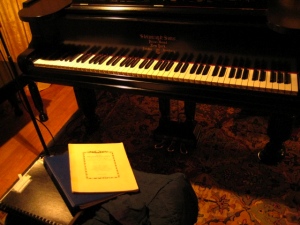


It’s a distinct pleasure to see a musical performance of a very high level in the comfort of a home. Joan Nagano, piano, and Kay Stern, violin, wanted to run through their program in front of an audience before performing at a chamber music festival in Tahoe. There were about 15 of us in this small preview audience. The program featured pieces by Boccherini, Paganini, Beethoven, Poulenc, Ben-Haim and Zarzycki.
The entire program was engaging and beautiful, but I want to focus on the Sonata for Violin and Piano by Poulenc. Before each piece, Kay Stern, who also serves as Concertmaster for the San Francisco Opera Orchestra, provided some context for the music. Here’s the text she read:
Several of Poulenc’s earlier attempts at writing violin sonatas and string quartets ended in the sewers of Paris, and the only string music of this nature which finally passed the composer’s fastidious scrutiny were the Sonata for violin and piano, and the Sonata for cello and piano (1948). The violin sonata was the result of pressures from the young violinist Ginette Neveu to write a violin piece.
Written during the German occupation of France, this work was boldly dedicated to the memory of Federico García Lorca – a Spanish poet murdered by fascist troops because of his liberal opinions and homosexuality. Poulenc had set three Lorca poems as songs in 1937. The violin sonata was intended as a personal statement on the poet’s senseless death. The middle movement was meant to be “vaguely Spanish” – evoking the distant guitars and Moorish cantilena of Lorca’s Spain. The concluding Presto tragico is as violent and brusque as Lorca’s death.
The chamber music of Poulenc is known for its melody and accessibility, this piece was challenging both in its construction and its emotional territory. The three movements take you on a emotional journey through darkness and violence. Perhaps there’s something about witnessing music like this in a domestic setting that sharpens the connections. For the duration of the performance there was crystal clear visibility into the haunting, tragic story of the murder of the poet and the tumultuous landscape of war. It was only as the last note rang out that the double parlor of a flat somewhere in San Francisco slowly came back into focus, and the audience was returned to their seats.
The Guitar
makes dreams weep.
The sobbing of lost souls
escapes from its round mouth.
And like the tarantula
it weaves a giant star
to capture sighs
that float in its black
cistern of wood.
Federico García Lorca
Comments closed